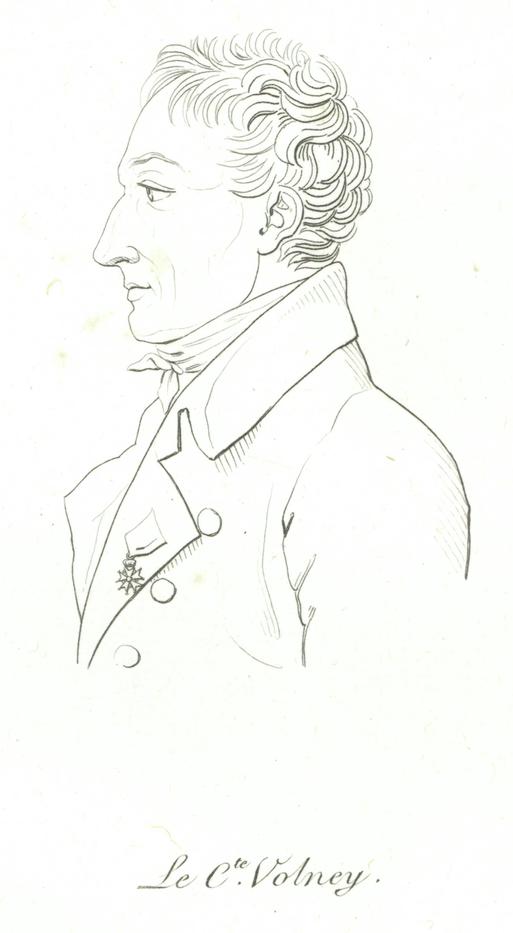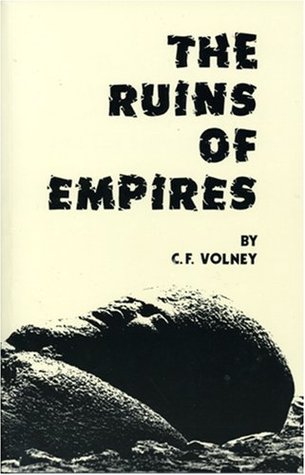Constantin-François de Chassebœuf de Volney

Constantin-François Chassebœuf de La Giraudais, comte Volney, dit Volney est un philosophe et orientaliste français.
Constantin-François de Chassebœuf de Volney is one of those historical personalities once famous in their own day but now largely forgotten. You’ve heard of people he knew, as well as the events he participated in, but you’ve never heard of the man himself.
Ever hear of Benjamin Franklin? Franklin, then Ambassador to Paris, mentored a young Volney in the years prior to the French Revolution and later introduced him to his successor, Thomas Jefferson.
Ever hear of the Estates General and the Tennis Court Oath? Volney took part in both events and later sat on the committee that wrote the first French constitution.
Ever hear of Napoleon Bonaparte? Volney discovered a young Bonaparte on the island of Corsica and helped his career on numerous occasions, including the 18 Brumaire coup that brought Bonaparte to power. Ever hear of the proclamation of the Empire when Bonaparte crowned himself Emperor? Volney was one of only three senators to vote against that counter-revolutionary bill.
Ever hear of the Alien Act in the United States? Volney, the most famous alien in the U.S. at that time, was forced to leave the country just before the new law went into effect.
Ever hear of an ideologue? Volney was one of the original Ideologues. The Ideologues supported constitutional government, separation of church and state, Adam Smith’s economic principles, abolition of slavery and universal suffrage. They were also correspondents with—again that famous name—Thomas Jefferson.
But those are all good things. So why is there a pejorative attached to the word ideologue today?
It’s because the Ideologues opposed Bonaparte’s dynastic designs. As a result Bonaparte started using the word almost as a curse and, a generation later, Karl Marx—recognizing the theories the Ideologues espoused refuted his own theories—picked up Bonaparte’s pejorative and spread it around the world.
Ever hear of Volney’s Ruins of Empires? Uh, well, no, you probably haven’t. But the book (“Les Ruines” in French) was once world famous—or infamous depending on your point of view.
You’ve heard of Thomas Jefferson of course. But I’ll bet you didn’t know Jefferson liked the book so much he secretly translated it into English. Ever hear of Abraham Lincoln? Lincoln read Volney’s Ruins as a young man and was deeply affected by it. Ever hear of Walt Whitman? Whitman’s most famous poem, Leaves of Grass, was directly inspired by Volney’s Ruins. Ever hear of Thomas Cole, founder of the Hudson River Valley School? His famous paintings—The Voyage of Life and Course of Empire series—were also directly inspired by Volney’s Ruins.
So why are both Volney and his book largely forgotten today? There are many reasons. But first and foremost it’s because he challenges the fundamental principles of both the Left and the Right.
The Left doesn’t like Volney because Ruins of Empires was written as a direct refutation of Jean-Jacques Rousseau’s Social Contract. If you refute the Social Contract, then you refute Socialism and all the various “social models” in Europe (and elsewhere) built upon it. Volney, therefore, has few if any friends among the left-leaning professorial class—the ones who are supposed to teach “enlightenment” to students.
The Right doesn’t like Volney because Ruins of Empires presents a solution to the world’s enduring religious conflicts. While that’s certainly a good thing—and particularly so in a post-September 11 world—the Right still considers Volney to be a heretic and an atheist. Why? Because Ruins of Empires argues for a universal code of morality based on the physical laws of nature. While that sounds innocuous, it implicitly calls into question all other codes of morality based on the existence of some invisible being no one has ever seen—i.e. “God.”
In sum, Volney has been forgotten

